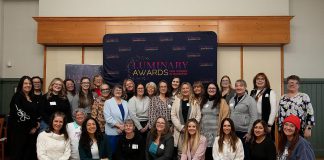
If you need to upgrade your skills to achieve your educational and career goals, Fleming College can help with its free Academic Upgrading program.
An Employment Ontario program funded in part by the provincial and federal governments, Academic Upgrading can help you refresh or acquire the essential skills you need for in-demand careers or help you move forward with your goals for entry into post-secondary programs, employment, or apprenticeship.
“This is a barrier-removing program that directly serves the community,” says Dr. Kate McIntosh, Vice President, Student Experience at Fleming College. “We exist to help students achieve their goals.”

Working in conjunction with other literacy and basic skills programs in the community including the Peterborough Native Learning Program, the Trent Valley Literacy Association, and the Adult Learning Network, Fleming College’s Academic Upgrading program works to meet the needs of students in a flexible and accessible way.
“We believe that access to education should be as barrier-free as possible,” says McIntosh.
Fleming College’s Academic Upgrading program offers courses in crucial subjects inclusive of math, computers, sciences, and communications. With a hybrid delivery model, learners can set their own pace, deadlines, and schedules, and start anytime. Learning modules include exercises or activities like presentations that mirror the classroom experience.

“Through this delivery, we aim to meet all learners’ needs and are mindful of the competing priorities in their lives, which can have a profound impact on their availability to attend more traditional educational programming,” says McIntosh. “As such, our service model is responsive to that.”
There are faculty accessible online seven days a week to provide assistance and learning supports for students when needed. Students who prefer in-person guidance can drop in to the classroom sessions and get assistance from expert faculty members at rotating times throughout the week.
“All of the instructors are committed to supporting learners and excited about what they’re teaching, which helps students to feel comfortable reaching out for support,” McIntosh says.

To improve accessibility, some of the Academic Upgrading offices are located centrally in their respective communities rather than on campus.
In Peterborough, the office is located in Peterborough Square (360 George Street North), while Haliburton’s is downtown above the SIRCH Bistro & Bakery (39 Maple Avenue). The Lindsay office is located at Fleming’s Frost Campus (200 Albert Street), while the Cobourg office is situated in the heart of the community (739 D’Arcy Street).
“It’s important for us to be centrally located to provide ease of access and a connection to other community supports,” says McIntosh.

Some of the course requirements include an in-person component, where students come into a classroom for an exam or evaluation in preparation for the post-secondary program structure.
“We incorporate experiential learning into our program to prepare learners for that next step, but we don’t want it to be a barrier,” says McIntosh, noting each of the Academic Upgrading locations is fully accessible. “We work in conjunction with our accessibility office at the college to ensure we are meeting the needs of all of our students.”
To further break down those barriers, Fleming College can provide financial support if transportation and childcare expenses present a challenge for students. Laptops and other tools are also available for students to use on-site to support their learning. Academic Upgrading staff are happy to meet with students to discuss these and other barriers to learning they may face and discuss solutions to help them reach their goals.
Fleming College’s Academic Upgrading program also works in partnership with collaborators like Homeward Bound Peterborough, a four-year program that supports at-risk single mothers in reaching their learning goals.

For students who did not receive their high school diploma but want the equivalent for post-secondary school admissions, Academic and Career Entrance (ACE) courses from Fleming College also offer flexible learning to meet such goals. Led by the College Sector Committee for Adult Upgrading, a not-for-profit support organization representing Academic Upgrading programs and staff in Ontario’s 24 public colleges, the ACE curriculum is consistent at all of the colleges.
For those seeking the equivalent of a secondary school diploma, students can take the Canadian Adult Education Credential (CAEC), a high school equivalency exam that replaced the General Educational Development (GED) exam in 2024, and which Fleming College hosts in partnership with Humber College.
“The CAEC is for those who want the diploma or proof that they have a high school education,” says McIntosh, noting the CAEC is not required for college admissions.

McIntosh adds that Academic Upgrading courses are also beneficial for employers who want to support their staff as they expand and develop skills in specific areas, such as computer or software training.
“If an employer has a certain need or they are looking for upskilling opportunities for their employees, we can tailor their learning,” says McIntosh. “In today’s market, employee retention can be challenging, so we’re thrilled to partner with employers to help demonstrate their commitment to and investment in their workforce through building these custom learning experiences.”
Prospective students can begin their Academic Upgrading journey by booking an appointment with a student advisor. They’ll consider the student’s goals and learning experiences and complete a skills assessment that helps the advisor craft a learning plan based on the student’s needs.
Student advisors may also refer the student to other community organizations based on their individual needs and goals.
“If you’re interested in learning more, I encourage you to reach out to us,” McIntosh says. “We are ready to help you achieve your education and career goals, in a way that fits your life.”
For more information on Fleming College’s Academic Upgrading program, visit www.flemingcollege.ca/academic-upgrading.
This branded editorial was created in partnership with Fleming College. If your organization or business is interested in a branded editorial, contact us.

























